This has gotten almost zero coverage in the mainstream media amid all the shutdown theater drama and 2020 presidential campaign announcements, but it’s a major story. U.S. officials have been meeting with leaders of the Taliban (!) in Qatar for the last week attempting to hammer out an agreement whereby we could finally exit Afghanistan. How we wound up at the table with the same people we’re supposedly trying to eradicate is something of a mystery, but reports coming out of Doha indicate that the basic framework for an agreement is close to being completed. (WaPo)
After six days of negotiations, Taliban insurgents and U.S. officials meeting in Qatar appear close to an agreement that could withdraw American troops after 17 years of war, reports said Saturday.
News agencies reporting from Doha, the Qatari capital, said the outlines of an agreement have been reached.
But it was not clear whether it would lay out a timetable for the U.S. troop pullback, as the Taliban have demanded, or a lengthy cease-fire while insurgent and Afghan leaders negotiate domestic issues, as U.S. officials have proposed.
If your immediate reaction to this news is one of revulsion, I can’t say I blame you. We’ve been fighting the Taliban every bit as much as Al-Qaeda for seventeen years. At one time there was a general understanding that we don’t negotiate with terrorists, but it appears that we’re now at the point where the Taliban is being looked at as at least one component of a legitimate Afghani government system. Hamid Karzai is out of office as president, but he’s still been going around urging more conversations with the nation’s former ruling entity and saying that the Taliban has to have a seat at the table if there’s to be any lasting peace and stability in their nation.
As much as it pains me to say it, we may have to just face up to reality at this point. After all this time, we’re no closer to completely defeating the Taliban and ensuring the lasting stability of the new government we helped set up than we were a decade ago. In fact, we’re losing ground. One recent report from our own government estimated that Ashraf Ghani’s government (with the support of America and our allies) only controls or “influences” 55.5% of the country.
It’s fair to ask what good any promises from the Taliban might be worth. They’ve made it clear that no agreement will be possible until all United States and allied troops are out of the country. At that point, what hope does the new government have? It appears that once we’re out of there, Afghanistan will go back to being essentially the same as when we arrived.
That’s not “a good thing” in any sense of the word, but we’re running out of other options quickly. Frankly, as soon as bin Laden’s body was dumped into the ocean, I thought we should have been making plans to pull out. Getting rid of the mastermind of the September 11th attacks was at the top of the original priority list and we accomplished it almost eight years ago. And as history has shown us repeatedly, nobody is ever going to fully “conquer” Afghanistan or completely reshape it. (At least not without conducting what would amount to a near genocidal cleansing of the land.)
Activists will correctly be alarmed about the fate of women, children, minorities and non-Muslims in the nation if the Taliban takes back complete control. It’s a horrible place where many horrible things happen. But if we can’t fix it permanently, how much longer should we stay?








Join the conversation as a VIP Member